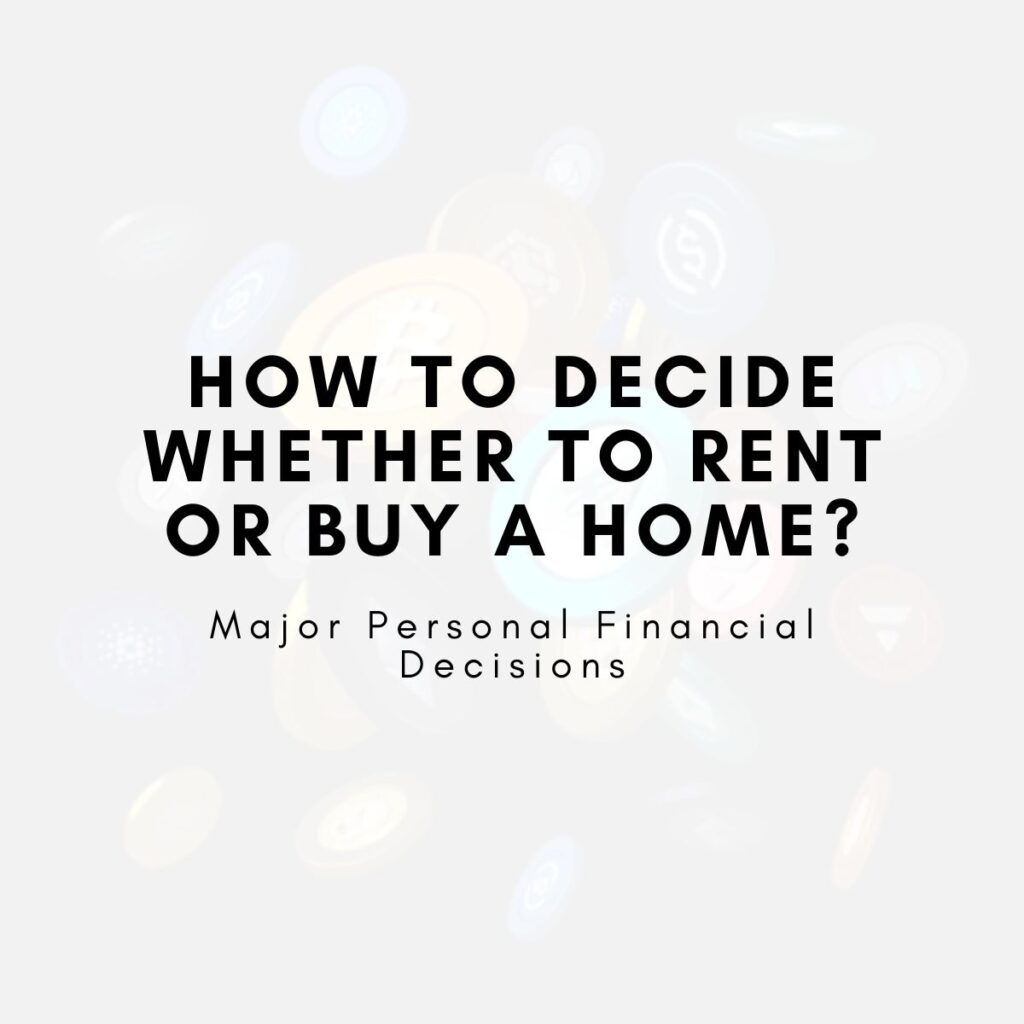
Should you rent or buy a home?
Making the decision between renting and buying is one of the biggest financial decisions you’ll ever face. This guide will help you weigh the pros and cons, evaluate your financial situation, and decide what’s best for your future.
Summary Table: How to Decide Whether to Rent or Buy a Home
| Section | Summary | Key Tips | Examples |
|---|---|---|---|
| Pros and Cons of Renting | Renting offers flexibility and lower initial costs, but you won’t build equity. You also face rent increases and limitations on customization. | – Consider flexibility if moving frequently is an option. – Prepare for potential rent hikes. – No equity. | Sarah rented an apartment when she moved for work, allowing her to settle in before committing long-term. John experienced rent increases over time. |
| Pros and Cons of Buying | Buying allows you to build equity and provides stability, but comes with high upfront costs and maintenance responsibilities. | – Think long-term with a stable job. – Factor in the upkeep costs of owning. – Consider market risks. | Mark bought a home with a fixed-rate mortgage and built equity over five years. Linda dealt with costly repairs shortly after buying her home. |
| Key Financial Factors to Consider | Evaluate your down payment, ongoing costs, and debt-to-income ratio to determine affordability. | – Save for a substantial down payment. – Assess whether your current financial situation supports a mortgage. | Tom saved for years to afford a 20% down payment on his home. Kevin decided to rent because buying would stretch his finances too thin. |
| Lifestyle Considerations | Renting offers more flexibility for those with uncertain plans, while buying suits those looking for stability and customization. | – Consider how long you plan to stay in one place. – Factor in your need for stability and customization. | Emily rented while planning to move abroad for work. Oliver bought to renovate and personalize his home. |
| Current Housing Market Conditions | The state of the market—whether it’s a buyer’s or seller’s market—can significantly impact your decision. | – Assess the current housing market to determine if it’s a good time to buy. – Consider low-interest rates. | Amy bought during a buyer’s market and saved significantly due to lower prices. |
| Renting vs. Buying Formula | Using rent vs. buy calculators can help you analyze the long-term financial implications of both options. | – Use online calculators to make a more informed decision. – Factor in all associated costs. | Brian used a rent vs. buy calculator and found buying would save him money over time. |
This table summarizes the key points from the guide, breaking down the pros and cons of renting versus buying, financial considerations, lifestyle preferences, and housing market conditions. The table also includes key tips and real-life examples to offer practical insights into each section, helping you make an informed decision based on your unique situation.
Introduction
One of the most common financial dilemmas people face is whether they should rent or buy a home. Renting offers flexibility, while owning a home comes with long-term benefits like equity building. But deciding which path to take depends on various factors such as your financial stability, future plans, lifestyle preferences, and the housing market conditions.
This guide will break down everything you need to know to make an informed decision about whether renting or buying is the right choice for you. We’ll examine the pros and cons, financial considerations, and other key factors that will help you determine which option is best suited for your unique situation.
Pros and Cons of Renting a Home
Renting a home provides flexibility but comes with its own set of challenges. Let’s take a look at the advantages and disadvantages of renting.
Pros of Renting:
- Flexibility: Renting offers flexibility to move quickly, whether for a job opportunity or personal reasons.
- Lower Initial Costs: Renting generally requires a deposit and first month’s rent, which is less upfront compared to buying a home.
- Maintenance-Free Living: As a renter, you’re typically not responsible for maintenance and repair costs.
Example: Sarah moved to a new city for work and rented an apartment, which allowed her to settle in before committing to a long-term home purchase.
Cons of Renting:
- No Equity Building: Rent payments don’t contribute to ownership, meaning you won’t build equity in the property.
- Limited Customization: Renting often comes with restrictions on decorating or making changes to the property.
- Rent Increases: Landlords may increase rent, making it more expensive to stay in the same place over time.
Example: John found that his monthly rent increased every year, which made him reconsider renting as a long-term solution.
Pros and Cons of Buying a Home
Buying a home is a significant investment, and it comes with both rewards and risks. Here’s a breakdown of the pros and cons of homeownership.
Pros of Buying:
- Building Equity: Each mortgage payment brings you closer to owning the property outright, which builds long-term wealth.
- Stability: With a fixed-rate mortgage, your monthly payments remain predictable, providing financial stability.
- Freedom to Customize: As a homeowner, you have the freedom to renovate, decorate, and personalize your home.
Example: Mark bought a home with a fixed-rate mortgage, and after five years, his home’s value increased significantly, giving him a solid return on investment.
Cons of Buying:
- High Upfront Costs: Buying a home often requires a substantial down payment, closing costs, and fees that can add up quickly.
- Maintenance and Repairs: Homeowners are responsible for upkeep, including maintenance and unexpected repairs.
- Market Risk: The housing market can fluctuate, and if property values drop, you could be left owing more than the home is worth.
Example: Linda faced expensive repairs after buying her home, which made her question whether homeownership was the right choice for her at that time.
Key Financial Factors to Consider
When deciding whether to rent or buy, your financial situation plays a crucial role. There are several key factors to evaluate to help guide your decision.
Initial Costs and Down Payment:
Buying a home usually involves a large down payment, which can range from 5% to 20% of the home’s purchase price. In contrast, renting typically requires only a security deposit and the first month’s rent.
Example: Tom saved up for several years to afford a 20% down payment on a home, which significantly reduced his mortgage payments.
Ongoing Costs:
Homeownership comes with ongoing costs like mortgage payments, property taxes, insurance, and maintenance. Renters only need to worry about monthly rent and utilities.
Example: Jane found that her monthly mortgage payments were slightly higher than her rent but appreciated the stability of owning her own home.
Affordability and Debt-to-Income Ratio:
Before buying a home, it’s important to evaluate your debt-to-income ratio. A lower ratio means you’re in a better position to handle the financial responsibility of a mortgage.
Example: Kevin ran the numbers and realized that buying a home would stretch his finances too thin, so he chose to rent for a few more years.
Lifestyle Considerations
Your lifestyle and personal preferences can also influence whether renting or buying is the better option.
Long-Term vs. Short-Term Plans:
If you plan to stay in one location for a long period of time, buying might make more sense. However, if you’re unsure of your future plans or anticipate frequent moves, renting offers more flexibility.
Example: Emily was planning to move abroad for work, so she decided to rent a place for the time being, knowing that buying wouldn’t make sense for her short-term plans.
Desire for Customization and Stability:
If you enjoy making changes to your living space and having full control over your property, buying might be the way to go. Renters are typically limited in how much they can modify their space.
Example: Oliver bought a home because he wanted to renovate the kitchen and install new flooring, something he couldn’t do while renting.
Current Housing Market Conditions
The state of the housing market plays a significant role in your decision-making process.
Buyer’s vs. Seller’s Market:
In a buyer’s market, there are more homes for sale than buyers, which can make purchasing a home more affordable. In a seller’s market, prices may be higher due to limited inventory, making renting a better option in some cases.
Example: Amy purchased her home during a buyer’s market when interest rates were low, getting a great deal on her property.
The Renting vs. Buying Formula: How to Calculate Your Decision?
There are several online calculators that help you determine whether renting or buying is more cost-effective. They take into account factors like the home’s price, interest rate, and your potential investment return.
Rent vs. Buy Calculator:
Using a rent vs. buy calculator can give you a clearer picture of the financial difference between renting and buying in the long term.
Example: Brian used a rent vs. buy calculator and determined that buying a home would save him money in the long run, even after accounting for all the associated costs.
Conclusion
Ultimately, the decision to rent or buy a home depends on a combination of financial factors, lifestyle preferences, and long-term goals. If you’re not yet financially prepared to buy a home or if you value flexibility, renting may be the best option. On the other hand, if you’re ready to make a long-term investment, buy a home, and build equity over time, purchasing may be the right choice.
By weighing the pros and cons, evaluating your financial situation, and considering the housing market conditions, you can make an informed decision that aligns with your current and future needs.
Key Takeaways
- Renting offers flexibility and lower upfront costs but doesn’t allow you to build equity.
- Buying a home allows you to build wealth over time but comes with higher upfront costs and long-term responsibilities.
- Consider financial factors such as down payment, ongoing costs, and your debt-to-income ratio before making a decision.
- Think about your lifestyle preferences, like whether you value stability and customization.
- Keep an eye on the housing market conditions, as they can greatly influence whether renting or buying is more advantageous at a given time.




